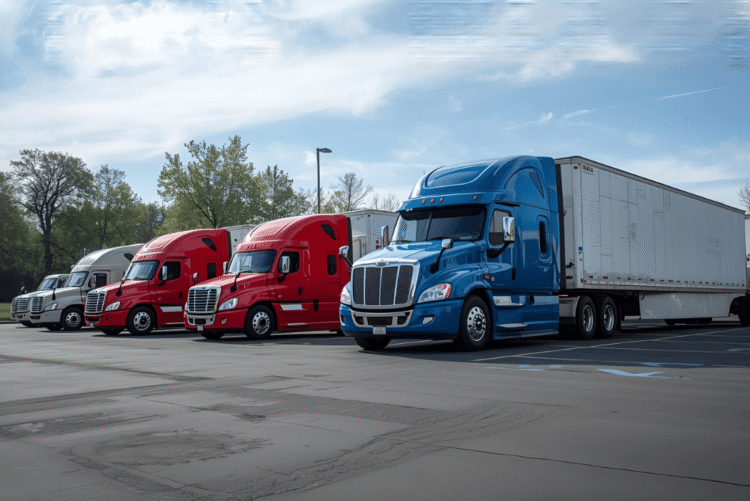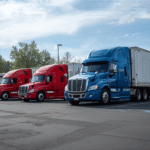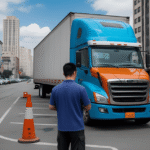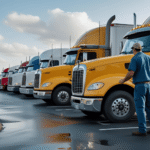

How Technology Is Transforming Truck Parking and Driver Safety
The Truck Parking Challenge Drivers Face
Every day, thousands of truck drivers crisscross America’s highways to keep supply chains moving. Yet one challenge continues to frustrate them: finding a safe, reliable place to park. With the shortage of designated truck parking spaces, drivers are often forced to park in unsafe areas, waste fuel searching for a spot, or risk fines for unauthorized parking.
At the same time, fleets and shippers are feeling the ripple effects. Delayed deliveries, compliance issues, and higher operating costs are all connected to the truck parking crisis.
But there’s hope technology is stepping in to change the game.
The Role of Technology in Truck Parking
New digital solutions are transforming how drivers, fleet managers, and lot owners handle parking. Here are some of the most important innovations:
1. Real-Time Parking Availability
Apps and platforms now use GPS, IoT sensors, and camera systems to show live parking availability. This saves drivers valuable time and ensures compliance with Hours of Service (HOS) rules.
2. Digital Reservations
Just like booking a hotel room, truckers can now reserve parking ahead of time. This eliminates the stress of last-minute searches and reduces unauthorized parking.
3. Automated Gate Access & Security
Technology like License Plate Recognition (LPR) and smart gate controls allow drivers to enter and exit lots without manual checks. This improves security, efficiency, and accountability.
4. Integrated Payment Systems
Instead of cash or manual billing, digital payment platforms now allow drivers to pay by the hour, day, or subscription all from their phones. This reduces administrative work for lot owners.
5. Fleet Dashboards for Parking Management
Fleet operators can now monitor where their drivers park, track expenses, and ensure compliance across multiple regions all through centralized dashboards.
Why Tech-Driven Truck Parking Matters for Supply Chains
Reliable parking isn’t just about convenience it’s about keeping goods moving. Technology-driven solutions directly impact:
- Driver Safety: Reducing theft risks and fatigue-related accidents.
- Fleet Efficiency: Less downtime, fewer delays, and lower fuel costs.
- Shipper Confidence: Improved reliability leads to stronger business partnerships.
- Sustainability: Reduced unnecessary driving lowers emissions.
As the logistics industry continues to digitize, smart truck parking systems will become the new standard.
Government and Industry Support
The U.S. Department of Transportation has already highlighted truck parking as a critical infrastructure need. With increasing freight demand and e-commerce growth, investment in smart parking facilities is expected to rise.
Industry players, like FindTruckParking, are at the forefront of these efforts connecting drivers with real-time solutions that improve safety and efficiency.
Frequently Asked Questions (FAQs)
Q1: Why is truck parking such a big issue in the U.S.?
Truck parking shortages exist because freight demand is rising faster than parking infrastructure. Many rest stops and lots haven’t expanded in decades, leaving drivers with limited options.
Q2: How does technology help drivers find truck parking?
Apps and platforms use GPS, IoT sensors, and reservation systems to show real-time availability, let drivers book ahead, and streamline check-in/check-out processes.
Q3: Is paid truck parking worth it for drivers?
Yes-paid parking often provides better security, lighting, and guaranteed availability, which helps drivers avoid fines, reduce stress, and save time.
Q4: How does better truck parking impact supply chains?
When drivers find parking faster, fleets save money, deliveries stay on schedule, and the overall supply chain becomes more efficient.
Q5: What role will technology play in the future of truck parking?
Expect to see AI-powered demand forecasting, autonomous vehicle parking integration, and connected logistics hubs that combine parking, fueling, and maintenance in one system.
Add a comment Cancel reply
Categories
- news (2)
- parking (6)
- truck-parking (5)
- Uncategorized (13)
Recent Posts
Popular Tags
Related posts


How to Find Safe and Legal Truck Parking in High-Demand Areas

Why Reliable Truck Parking Is Crucial for Drivers, Fleets, and the Entire Supply Chain







